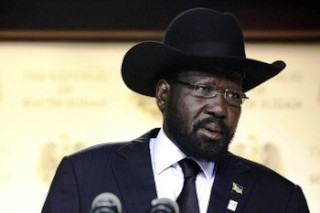S. Sudan’s Kiir criticises AU over oil row with Khartoum
June 10, 2013 (JUBA) – South Sudan leader, Salva Kiir on Monday questioned the credibility of the African Union (AU), saying the continental body failed to take the lead in resolving its current oil row with neighbouring Sudan.

“This latest turn of events brings into question the credibility of the African Union mediators but we remain optimistic that they will intervene accordingly”, Kiir told reporters in the capital, Juba.
“We urge both regional and international governments to diplomatically engage with Sudan in order to protect the lives of the citizens of both nations and to encourage Sudan to engage in peaceful dialogue with their internal rebellion,” he added.
In September last year, Sudan and South Sudan signed a series of cooperation agreements, which covered oil, citizenship rights, security issues, banking, and border trade, among others.
On 25 January, at the AU Peace and Security Council (PSC), convening during the AU Summit in Addis Ababa, adopted a communiqué on Sudan-South Sudan, which among others, stressed the need for he two countries to unconditional implement the 27 September 2012 agreements.
But while Kiir and his Sudan counterpart Omer Hassan Al-Bashir met on the margins of the AU Summit on 27 January, the two failed to make progress on how to implement the 27 September agreements.
Meanwhile, the South Sudanese leader said his government had still not received any official notification from the government of neighbouring Sudan despite its president threatening block its oil flow to export markets.
He warned that any attempt to block the flow of oil to international markets would undermine implementation of a cooperation agreement signed by both leaders in September 2012 as part of attempts to resolve a number of ongoing disputes over post-secession issues.
The South Sudanese president was forced to call an emergency cabinet meeting on Sunday following remarks made by Bashir, in which he ordered his oil minister, Awad al-Jaz, to block the flow of South Sudan’s crude oil to international markets via Sudanese pipelines.
Bashir’s announcement on Saturday came in response to allegations that the new nation supports Sudan Revolutionary Front (SRF) rebels fighting Khartoum on multiple fronts.
Kiir said his government had been relying on media reports for information, following the threatened shut down, but had yet to receive any further communication from its northern neighbour on the matter.
“We are reading these statements and orders to block the oil flow from the media, but the oil continues to flow. Sudan cannot just decide to stop the flow. There are certain things and procedures to be followed because it involves other stakeholders. Closing it abruptly will undermine implementation of the cooperation of the agreement”, Kiir told journalists on Monday.
According to the cooperation agreement, however, Khartoum has to inform Juba two months in advance before it can take any decision to shutdown its oil pipelines.
It will be a huge setback, analysts argue, to the agreements brokered by African Union mediation team, should Sudan implement its plan to shut the oil pipeline.
KIIR DENIES REBEL SUPPORT
Meanwhile, the South Sudan leader denied his government was providing support to the SRF – a coalition of Sudanese rebel groups fighting to topple the Bashir regime in the war-ravaged region of Darfur and in the two border states of Southern Kordofan and Blue Nile.
“It is not true that we support these groups. Where do we get these facilities when there are a lot of demands and needs to provide basic services to our people? Our people need roads to link them. They need health service. If we have these facilities we will channel them [in]to improving the lives of our people. We will not buy weapons to other armed any other groups”, said Kiir.
He maintained his government was still committed to fully implementing the cooperation agreements, despite ongoing disagreements, saying ultimately it was in the best interests of the two countries to live in peace and develop better relations.
“We are committed to implementing the cooperation [agreements] so that we build mutual trust and live in the two viable states in pursuit of mutual benefits. This is what we are after. We are not after anything that will destabilise any of our neighbours, including the Republic of Sudan”, he said.
“NO BENEFITS FOR WAR”
The former rebel commander turned politician, who went on to become president after the South gained independence in July 2011, called on South Sudanese people to remain calm and exhibit self-control despite provocative remarks from his Sudanese counterpart and members of his administration.
He also reiterated his government’s commitment to peaceful dialogue.
“While president al-Bashir has declared jihad (holy war) and is mobilising for war, I maintain my pledge to you and the world that I will not take the people of South Sudan unnecessarily back to a state of war. I therefore call you to remain calm and be patient as we work with the African Union (AU) to resolve this impasse with Sudan”, Kiir told reporters.
“There are no benefits for war. We know it. This aggressive attitude of Khartoum is not new and we should not be surprised,” he stressed.
(ST)
